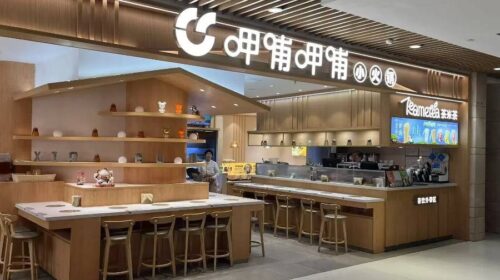Haidilao says ‘Hi’ to new budget brand

The popular hotpot chain’s rollout of its lower-priced Hailao brand comes as diners cut back their spending in China’s weakening economy
Key Takeaways:
- Haidilao’s new Hailao budget hotpot chain got a generally positive reception during China’s recently concluded weeklong National Day Holiday
- Hailao’s average spending of 79 yuan per customer is 23% lower than Haidilao’s average
By Edith Au
Restaurants are doing whatever it takes to survive in China’s fiercely competitive dining-out industry, especially in the hotpot arena whose popularity is matched only by the huge number of outlets catering to the trend.
Leading chain Haidilao International Holdings Ltd. (6862.HK) rose to early fame for its unique customer service, but has lately turned to other extras like free hair-washing services at some of its stores to maintain its edge. At the other end of the spectrum, the company is also offering a more bare-bones proposition with Hailao, a more affordable brand whose launch late last month dovetails with growing consumer caution in China’s slowing economy.
Haidilao’s newfound taste for affordability was well received during the recent weeklong National Day holiday, which saw millions of Chinese take to the road. The move shows the chain, whose name means “scooping up from the bottom of the sea,” is trying to serve up its own change as China emerges into a post-pandemic era of sharply slower growth than earlier times.
Haidilao officially launched Hailao, its first sub-brand, with the opening of the chain’s first store on Sept. 26 in Beijing’s Longfor Paradise Walk shopping mall. It received just a few reviews that day on Dianping, China’s equivalent of Yelp, but the number quickly grew to 164 a week after the opening. The mostly positive reviews seem to show that consumers are giving an early thumbs up to the new slimmed down edition of Haidilao for the budget-conscious.
Hailao’s prices are indeed quite affordable. The chain only offers two choices of hotpot soup base, a milder one costing 19.8 yuan ($2.71) and a spicier version costing 29.8 yuan. By comparison, a mild base with the same name sells for at least for 88 yuan at Haidilao’s traditional stores. The cost of beef to dunk in Hailao hotpots also looks quite affordable at 28 yuan to 49 yuan per serving, compared with 70 yuan to 84 yuan for similar products at Haidilao. Those lower prices mean Hailao’s spending per customer averages just 79 yuan, well below Haidilao’s 103 yuan in the first half of this year.
Simpler menu
Unlike Haidilao, the new Hailao sells little mutton – a popular option for hotpot – and instead offers mostly beef. The limiting of both its soup bases and hotpot dunking ingredients allows the chain to control costs more easily. What’s more, some of Hailao’s hotpot ingredients are sold in a self-service, cafeteria-style format where customers choose ingredients from a cabinet, helping the company to reduce labor costs.
Haidilao has long been famous for its unique blend of customer services in China’s restaurant scene, providing free fruit, hand care, manicures and other services to customers as they wait to be seated. A clip that went viral on the internet even shows waiters helping customers’ children with their homework as they waited for tables.
In August, Haidilao began to introduce hair washing services in the Eastern city of Wuxi, setting another precedent for the hotpot industry. But such over-the-top services have also led to high labor costs for the chain, accounting for as much as 30.5% of revenue in the first half of this year, far higher than the 25% for rival Jiumaojiu (9922.HK). Such costs could start to come down considerably with Hailao now in the mix.
The pandemic made 2021 one of Haidilao’s toughest years since its listing in 2018. The company posted a loss of 4.16 billion yuan that year, marking its first drop into the red post-IPO. The company, which was previously criticized for expanding too quickly, announced it would shut down 300 stores by the end of that year. It also announced a broader shift in its business strategy, including layoffs, a slowdown of new store openings, and improved store efficiency.
More than a year later, Haidilao finally saw the light of day by returning to the black with a 2.26 billion yuan profit in the first half of this year, as its revenue rose 24.6% to 18.9 billion yuan.
Despite that rebound, Haidilao’s recovery still pales in comparison to its hotpot counterparts. Among them, Xiabuxiabu (0520.HK) reported its revenue rose 32% in the first half of the year to 2.85 billion yuan, while Jiumaojiu saw its revenue jump 51.6% year-on-year during that period, including a massive 331% jump for its newer, fast-growing Song Hot Pot chain.
Still, Haidilao’s shares have rallied nearly 30% since early July with its return to the black, as the chain regains some of its former glory. The stock is once more at the head of its peer group with a forward price-to-earnings (P/E) ratio of 25, compared with a 16 for Jiumaojiu and just 9 for Xiaobuxiabu.
The consumer caution challenge
While the lifting of China’s strict Covid control policies helped to fuel a rebound across the dining-out industry, growing consumer caution has begun to emerge this year as a major new challenge. Haidilao, Xiabuxiabu and Jiumaojiu all reported their spending per customer fell in the first half of this year. Xiabuxiabu’s figure dropped from 63.1 yuan in the first half of last year to 58.2 yuan, while Jiumaojiu’s main Tai Er chain dropped from 78 yuan fell to 75 yuan over that period. Haidilao’s figure dropped from 105 yuan to 103 yuan.
Following the Hailao launch at Beijing’s Longfor Paradise Walk shopping mall, the chain is also preparing to open another store outside Beijing’s Chaoyangmen area, according to Dianping. An internal media query into the business registration information app Tianyecha found that Haidilao began applying for Hailao-related restaurant trademarks as early as October 2020, showing the company has been considering such a lower-end diversification to cope with growing consumer caution for a while.
Given its strong bargaining power in the supply chain, the company should be able to improve its gross margin if Hailao can further reduce its costs. That could provide some powerful investor food for thought as the company seeks to regain some of its former glory in a more consumer-cautious China restaurant market.
Have a great investment idea but don’t know how to spread the word? We can help! Contact us for more details.
The Bamboo Works offers a wide-ranging mix of coverage on U.S.- and Hong Kong-listed Chinese companies, including some sponsored content. For additional queries, including questions on individual articles, please contact us by clicking here.
To subscribe to Bamboo Works free weekly newsletter, click here






